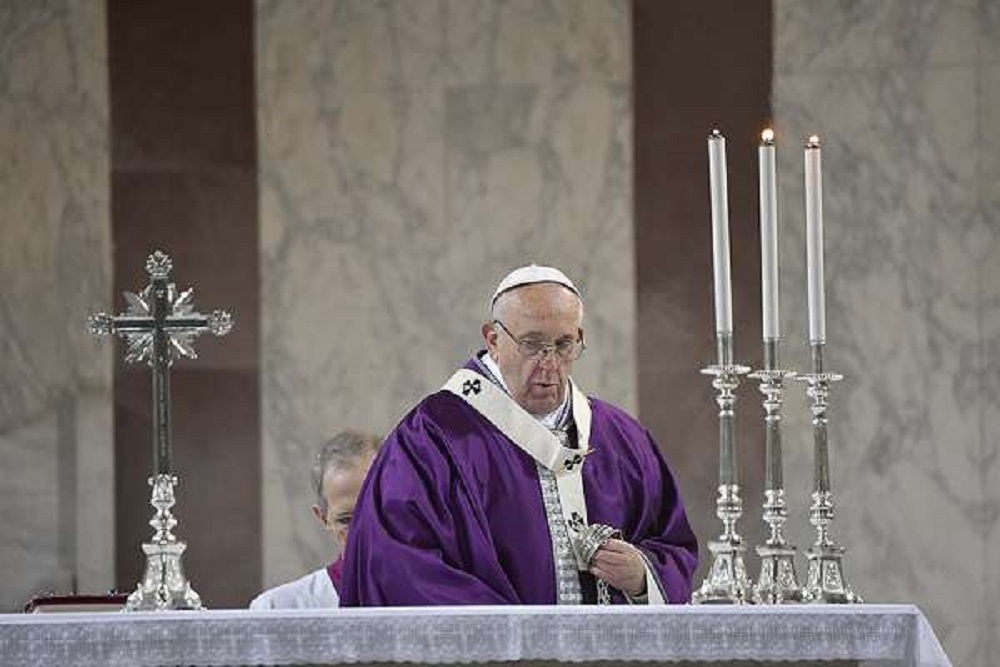Nativity of the Blessed Virgin Mary issued the following announcement on Feb. 25.
In a pastoral letter anticipating the beginning of Lent on Wednesday, Archbishop Socrates Villegas of Lingayen-Dagupan has asked that the faithful not clap in church, either during or after Mass.
“The season of Lent has a somber purple color. It has a sober and calm aura. The altar decors are restrained. The musical instruments are subdued. We fast from pleasure and restrain our appetite,” the archbishop wrote in his pastoral letter.
“Let us add more abstinence to this sober season,” he exhorted. “Let us abstain from applause in Church. May this abstinence from clapping flow over into the other days of the year. That in all things, God alone and Him only may be glorified!”
Archbishop Villegas noted that Ash Wednesday is “a good occasion to reflect on the value and importance of sobriety, silence and self-restraint in the pursuit of holiness of life.”
Setting aside clapping at a Mass of ordination to signify consent to the calling, which is directed to God, he suggested that “this is not the case with many of our applauses in the church.”
He said applause is a product of boredom during Mass, noting that it reduces the liturgy to a source of entertainment rather than a spiritual encounter with Christ.
“Is not this boredom coming from a misunderstood sense of worship and prayer? The community of prayer becomes just an audience in need of entertainment; liturgical ministers become performers; and preachers become erudite toastmasters. It should not be so.”
The archbishop cited the words of two popes on applause during the liturgy.
According to a story that seems to originate in the biography by F. A. Forbes, first published in 1918, St. Pius X disallowed applause at St. Peter's, which had become customary at papal services, saying, “It is not fitting that the servant should be applauded in his Master's house.”
Archbishop Villegas also cited the words of Benedict XVI, who wrote in The Spirit of the Liturgy that “Wherever applause breaks out in the liturgy because of some human achievement, it is a sure sign that the essence of liturgy has totally disappeared and replaced by a kind of religious entertainment.”
The archbishop said that while ovation does signify a sense of gratitude and recognition of a job well done, it is often ordered to the actions of priests or parishioners. The Mass should be directed at God alone, he said.
“Clapping can be shallow and cheap,” he said, adding that while applause for benefactors is justified as an inspiration to greater generosity, “We need to inspire our benefactors to seek treasures that 'moth cannot decay destroy, and thieves cannot break in and steal'.”
He noted also that “it can even brood unpleasant competition, jealousy and resentment because somebody received less applause than the others.”
And rather than applauding for ministery well done by the choir or servers, “let us lead our people to aim to decrease so that the Lord may increase,” he exhorted.
“In public prayers and liturgy, self-consciousness must bow down to God- consciousness. We are a Church called together by God not a self-organized mutual admiration club.”
He urged ministers to resist applause for their works: “Resist the ego booster and aim for greater things. Be an arrow pointing to God.”
The archbishop encouraged relatively shorter homilies, saying that applause shouldn't be used to keep parishioners “alert and awake.” “A well prepared, brief, inspired and inspiring homily has a longer lifespan than intermittent clapping as you preach.”
He also urged that priests not acknowledge persons or groups for their work or donations at the post-communion: “You must do this appreciation outside the Mass, by sending a greeting card, sending a text message or even visiting them in person. Be God centered and to Him alone be the glory.”
Archbishop Villegas also stressed the Mass' dual nature as both joyful and sorrowful: “The Eucharist is a happy feast AND a memorial of Calvary. Who would have clapped at Calvary? Would the Blessed Mother and John the Beloved have clapped? The breaking of the Bread is a commemoration of the violent death that the Lord went through. Who claps while others are in pain? It is pain with love; yes, but it still pain.”
Original source can be found here.







 Alerts Sign-up
Alerts Sign-up